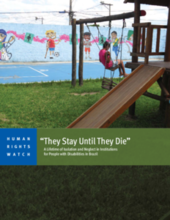Displaying 281 - 290 of 771
The aim of this study was to assess the nutritional status of children residing at an orphanage.
The objective of the study was to assess the knowledge and practices regarding menstrual hygiene among adolescent girls residing in selected orphanages of Haryana.
This study examines the forms of abuse and neglect experienced by children living in orphanages in East Java Province, efforts by children in orphanages to deal with the acts of abuse experienced, and the role of the orphanage or the Child Social Welfare Institution (LKSA) in providing protection and fulfillment of the rights of abandoned children.
The current study from the Infant Mental Health Journal addressed whether two institution‐wide interventions in St. Petersburg, Russian Federation, that increased caregiver sensitivity (Training Only: TO) or both caregiver sensitivity and consistency (Training plus Structural Changes: T+SC) promoted better socioemotional and cognitive development than did a No Intervention (NoI) institution during the first year of life for children who were placed soon after birth.
The purpose of this study was to establish the prevalence of symptoms of anxiety disorder, depression and post-traumatic stress disorder (PTSD) among adolescents with a history of abuse and neglect living in charitable children’s institutions (CCIs) in Nairobi County, Kenya.
This paper seeks to contribute to debates about how people's adult lives unfold after experiencing childhood adversity. It presents analysis from the British Chinese Adoption Study: a mixed methods follow-up study of women, now aged in their 40s and early 50s, who spent their infant lives in Hong Kong orphanages and were then adopted by families in the UK in the 1960s.
This paper explores what happens to children separated from their families at the U.S. border with Mexico by examining the nature of the services and programs provided while they are in temporary foster care.
This report documents a range of abuses against children and adults with disabilities in residential institutions in Brazil.
The aim of the systematic review described in this article was to determine the outcomes for individuals exposed to severe neglect in congregate care institutions such as orphanages.
This study from the Bucharest Early Intervention Project (BEIP) examines the brain electrical activity of children and young people who have been institutionalized.


